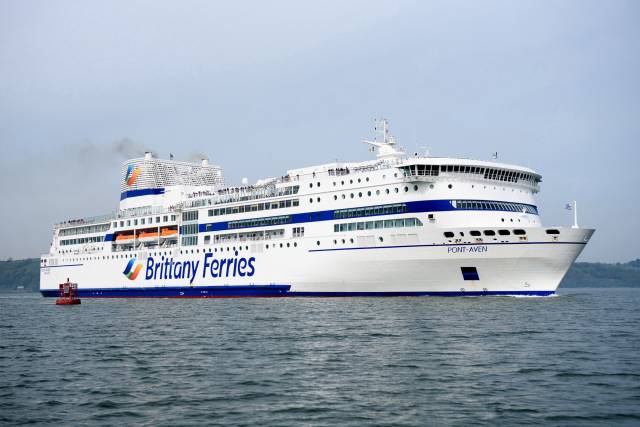Brittany Ferries have been forced yet again to cancel sailings on its Cork-Roscoff route due to operational reasons as flagship Pont-Aven continues to be beset with technical issues, writes Jehan Ashmore.
Currently Pont-Aven remains in dry-dock at Damen Shiprepair, Brest, following an hydraulic problem which took place in mid-May while on a sailing from the UK to France.
The incident led in turn to cancelled sailings on the Ireland-France route where affected passengers to date and next weekend (1 June) have been offered to defer the sailing to a later date (subject to availability) or cancel and receive a full refund.
Brittany Ferries are in the process of assisting customers and await a confirmed date of Pont-Aven's return (see updates) in addition the operator have taken the precaution of blocking any further bookings on cruiseferry between now and 7 June.
Communication of developments will also be made as soon as possible via our sailings update page.
An in-depth investigation has begun by the French operator into the incident.
Commenting about the incident Christophe Mathieu, Brittany Ferries CEO who said “We are all truly sorry for the further problems with our flagship vessel Pont-Aven. Unfortunately she has suffered two technical problems in rapid succession. While the previous engine problem, which reduced the ship’s speed from 24 knots to 20 knots, is entirely unrelated to the current steering gear issue, the consequence of further bad luck is significant inconvenience for our passengers."
The German built Pont-Aven is fitted with two entirely independent Rotary Vane steering gears, each operating one of two rudders. These are self-contained units positioned at her stern directly above the rudders . Hydraulic oil is injected at high pressure into a series of chambers which operate the rotating part of the steering servo-motors. As these chambers fill, the rotor turns, thus moving each rudder in the desired direction.
According to Brittany Ferries, Pont-Aven’s engineers were alerted to low oil pressure in the starboard steering gear. An oil leak was identified which caused the pressure loss and a reduction in steering capacity. Under these circumstances, the decision was immediately taken to take Pont-Aven out of service in Roscoff, for investigation and remedial work to be carried out in Brest.
Unfortunately, following further investigation it was found that damage to the starboard side steering gear was more extensive than originally suspected. This has meant a longer lay-over in Brest than originally planned to source replacement parts and carry out a comprehensive repair.
A repair procedure has been defined with the agreement of Bureau Veritas (certification authority) and the manufacturer. In parallel, a complete check of the port steering gear has been carried out.































































